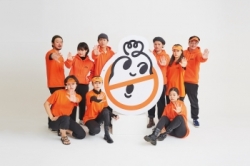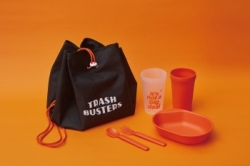
Kwak Jae-won, who worked for about a decade in a Seoul city-affiliated organization in charge of organizing major city festivals, resigned from his job to save the planet.
While working in the organization, Kwak was enraged by the ambiguity of the governmental guidelines on the usage of disposable products in the public sector. He realized how serious waste problems were when he faced tons of waste produced at festivals. Turning this anger into motivation and motivation into power, Kwak started a trash-reducing business called Trash Busters.
The name Trash Busters was inspired by the 1984 American film about combatting ghosts, Ghostbusters. Like the organization in the movie, Trash Busters aims to fight against a terrifyingenemy, in this case, disposable products.
Amongst all the occasions in which waste issues arise, Trash Busters specifically focused on major festivals and event sites, where individuals have fun while eating and drinking. The festive atmosphere leads to a buildup of waste, especially from the overuse of ‘convenient” single-use containers. To create an environmentally friendly and clean festival without trash, Trash Busters provides a service to reduce disposable wastes by lending and managing reusable tableware.

Kwak stated that the process that he had to go through was not easy as there were some issues that were new to him. When establishing the company, he faced hardships including developing a business model, obtaining background information on expandability, sustainability, environment and legislation on related issues.
“Despite all challenges I have faced along the way, my biggest motivation to start the business was the realization that waste is a common issue recognized by all individuals,” Kwak said. “I believed that if I were to solve this problem, it would be a major breakthrough and would naturally lead to a successful business, protecting the environment.”
When asked about the most rewarding moment that he encountered while running Trash Busters, Kwak stated that it was when they offered their service for the first time.
“Since it was our first time offering the service, everything was unpredictable, and in fact the team was expecting some opposing opinions,” Kwak commented. “However, it turned out to be a much greater success than we had expected.”
According to Kwak, the first festival Trash Busters took part in originally produced 300 to 400 of 100-liter trash bags. However, because of their service, only five 100-liter bags were used.
“Our work at this festival gained lots of attention,” Kwak added. “On social media, people wondered how a festival without any disposables was even possible.”
Although Trash Busters has had significant achievements in making zero-trash festivals, they have also had an impact on university campuses, even at Ewha. In collaboration with Korea Green Foundation, the two organizations created Seoul Orae Cup, a reusable cup sharing service for university campuses, which aims to raise awareness about using less plastic. This service was first tested in and can still be found in the café at Ewha’s Student Union building.
Furthermore, as the consumption based on take-outs and deliveries have been drastically increasing due to the prolonged COVID-19 pandemic, Trash Busters is attempting to solve the possible waste issues that may arise from this phenomenon as well.
“Due to the coronavirus, compared to last year, the delivery market has grown by 87 percent. That being said, there is a large increase in disposable waste being produced. Not being able to recycle these materials is a very serious issue,” Kwak said. “Thus, all of our members at Trash Busters are working on how to deal with the disposable materials coming from deliveries.”
In fact, Kwak further mentioned that they have already met with top Korean food delivery companies including Baemin, Yogiyo, and Coupang Eats to discuss these issues.
“The three companies we met have all agreed to actively cooperate in coming up with solutions,” Kwak added. “By next year, hopefully, you will be able to see deliveries without any disposables.”
Kwak concluded that in order to tackle environmental issues effectively, looking at them from the perspective of a business is what is needed.
“Rather than approaching environmental issues with campaigns, I would like to see more environment- related businesses out there competing against each other so that there could be a faster change in our society.”

